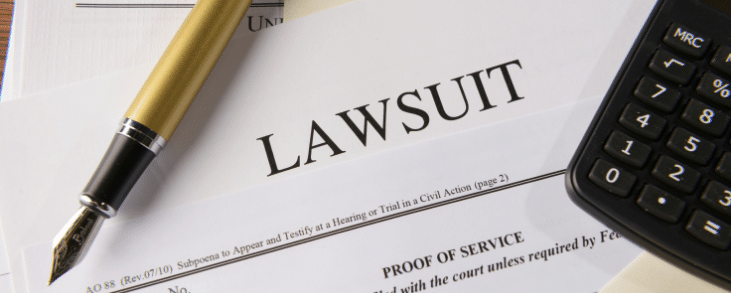If you’ve been contacted by a debt collector about a debt they claim you owe, you may start fearing the worst. You may wonder, can debt collectors take you to court, even if the debt doesn’t belong to you or you’re not obligated to pay? And how often do debt collectors take you to court instead of trying to work things out directly?
The answer is it depends. Debt collectors purchase debt from creditors for a fraction of the original balance, which means they can afford to spend extra time and effort to collect the full amount. Depending on how much you owe, the circumstances of the debt, and the collection agency, you may face a lawsuit before you know it.
What Can Happen if You’re Sued by a Collection Agency?
Debt collectors will do anything in their power to legally collect a debt, such as credit card debt or other debt, that you may or may not owe. In some cases, they’ll even break federal law, such as the Fair Debt Collection Practices Act (FDCPA) or other Federal Trade Commission (FTC) regulations. They do this by harassing you, contacting others about the debt, and threatening arrest or another form of legal action without intention.
But if a creditor or collection agency files a lawsuit against you, it’s critical that you take it seriously.
The summons you receive should list a date by which you need to submit your response to the lawsuit. If you don’t respond, the court may issue a default judgment, which essentially gives the debt collector what they want. This can include:
- Garnishing your wages
- Seizing personal property
- Putting liens on your property
- Freezing or garnishing your bank accounts
Even if you don’t believe the debt belongs to you or it’s time-barred debt — meaning it’s past the statute of limitations in your state — you’ll still want to prepare a response quickly.
How Often Do Debt Collectors Take You to Court?
Roughly 15% of Americans who have been contacted by a debt collector about debt have been sued, according to a 2017 report by the Consumer Financial Protection Bureau (CFPB). Of those, only 26% attended their court hearing — again, a big no-no.
The circumstances surrounding the decision to file a debt collection lawsuit can vary from situation to situation. But in general, lawsuits can be expensive, so collection agencies typically won’t sue right out of the gate. Instead, they’ll try other tactics and then sue once they’ve exhausted their alternatives.
But when will a debt collector sue you? Depending on this situation, this can happen after several months of attempts to collect, or it can occur shortly after you request that they no longer contact you.
As a result, you must be vigilant as soon as you get that first contact.
What to Do if a Collection Agency is Suing You
The idea of being sued can be daunting, especially if you have no prior experience with the legal system. Fortunately, it’s not a guarantee that you’ll lose. Here are some steps you can take to avoid a court judgment against you.
Gather Your Documentation
When a collection agency first contacts a person about a debt, they must send a validation letter within five days of that contact. The written notice contains the following information:
- The amount of the debt owed.
- The name of the creditor seeking payment.
- A disclosure that the debt is presumed valid unless you dispute it within 30 days of the first contact.
- A statement that the collection agency will verify the debt if you request more information or dispute the debt within 30 days.
- A statement that the collection agency must provide information about the original creditor if you request it within 30 days.
In many cases, it’s unlikely that a debt collector will sue you during those first 30 days. But if you’ve filed your dispute, you can use this information in your response to the collection agency.
You’ll also want to collect any other documents that support your assertion that the debt doesn’t belong to you or that it’s time-barred or old debt that the agency can’t legally collect.
Consult With a Debt Attorney
If your financial situation isn’t in great shape, you may balk at the idea of hiring a lawyer to help you out. But in many cases, the initial consultation is free. And if you can win the case, you can often have the court require the collection agency to pay your attorney fees.
Consulting with a debt attorney can give you the information you need to make the right decisions regarding the lawsuit. An attorney can also help you understand and protect your rights, and they can employ defense tactics that come from years of experience working against debt collection agencies.
A debt attorney can also help you decide whether to try to settle the debt out of court instead of going through the whole legal process. Even if a collection agency is confident it will win, it may get more money that way because it won’t have to incur legal fees.
Pursue Debt Settlement
If — and only if — the debt belongs to you and you’re not confident the judge will rule in your favor, it may be a good idea to try to negotiate a settlement with the collection agency.
With this process, you’ll typically enlist the help of a debt attorney or a debt settlement company. You’ll begin a monthly payment plan into an account with the firm. Then, once it’s reached a certain balance (typically based on what you owe), they’ll negotiate on your behalf to pay less than the full amount.
Again, the collection agency may prefer this outcome because they can still profit from the debt they purchased without incurring the time and money associated with a lawsuit.
The debt settlement process can show up on your credit report and lower your credit score. But if you’ve already missed several payments and defaulted on the original debt, your score may already be in poor shape, and settlement can give you the best result for your finances.
Show Up in Court
If debt settlement isn’t an option, ensure you’re ready and prepared for your court date. As previously mentioned, working with a debt relief attorney can maximize your chances of defending yourself and winning the case.
Even if the debt does belong to you, you may be able to get a judgment against the collection agency if they broke laws in their efforts to get you to pay. You’ll need to provide evidence of this, so it’s important to record all of your phone calls or request that the agency only contacts you in writing.
If the collection agency ends up winning, showing up helps you avoid a default judgment and give you a chance to plead your case. You may be able to work out another way for payment that doesn’t involve wage garnishments, liens, or account freezes.
The Bottom Line
Nobody wants to get sued, especially if it’s over a debt you’re not obligated to pay. If a debt collection agency files a lawsuit against you, it’s absolutely crucial that you take it seriously. With these steps, you can improve your chances of having the court rule in your favor or getting a settlement agreement.
If you’ve been sued by a collection agency, call Tayne Law Group for a free consultation. We’re a law firm with decades of experience and can equip you with the information and defense you need to protect your rights and finances.





